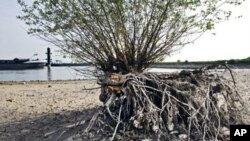Dry weather in parts of Europe is threatening production of key crops like wheat - at a time when the world is already battling high food prices and agricultural problems in other areas.
Thursday's weather forecast brought some good news for parts of France - rain. But for the rest, it's more of the same - clear skies and sunshine.
Outdoor cafes are packed. But the French government is worried. Authorities have announced water restrictions in about a third of the country. This week, Environment Minister Nathalie Kosciusko-Morizet called the situation "critical."
Farmers are particularly concerned.
Dairy farmer Alain Duchemain told French TV his cows are having a hard time finding enough grass for grazing. Duchemin's hay harvest was a month early - and half the normal yield.
Poland, Austria, parts of southern Germany and Britain are also experiencing unusually dry weather and high spring temperatures.
Ignacio Perez, cereal analyst for the Paris-based Organization for Economic Cooperation and Development, said it's still early in the crop season. And while Europe accounts for one-fifth of the world's wheat production, so far drought has not hit Europe's biggest agricultural heavyweights, Russia and the Ukraine.
But Perez says the European drought is a concern from a global perspective.
"The situation is worrying, but it's more worrying due to the fact we are in a period of uncertainty regarding high prices, expectations of high supply response due to an excess of demand for food products in the world," said Perez.
Parts of Canada and the United States are experiencing heavy rains and flooding, while droughts are hurting crop production in Western Australia and China. This is happening as global demand for food crops is growing - and prices are rising.
That trend may well continue - especially if global warming is playing a role in these weather patterns- as Perez believes is the case.
"If we move more into a worldwide problem in terms of food security and production starts to be more and more important, we're going to have to revise some policies," said Perez.
European Union countries have been focusing on improving the quality of crop production and farmers' incomes. Now, Perez says, they will have to work on boosting production - and investing in technologies like irrigation to deal with future droughts.
Driest Weather in Decades Threatens Europe's Key Crops




